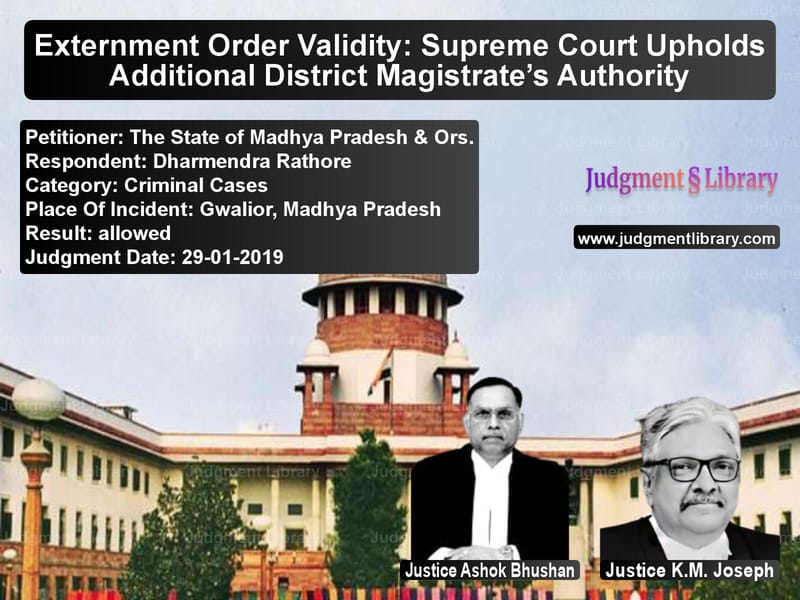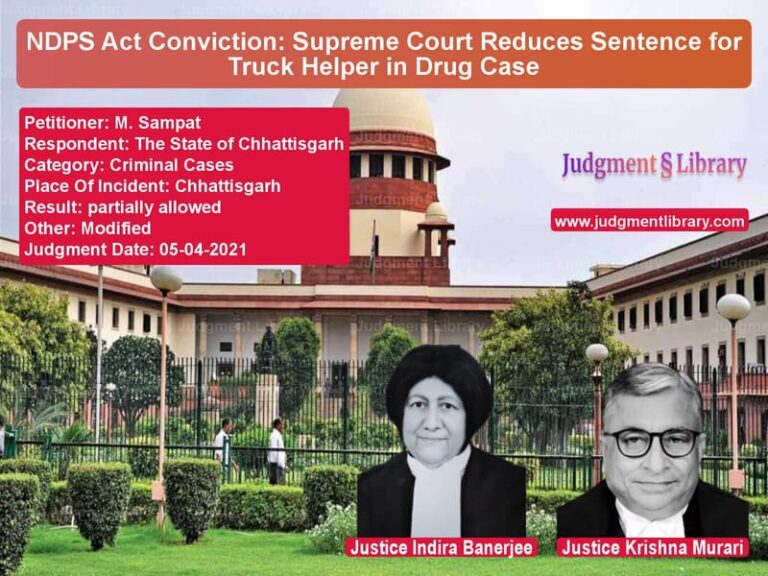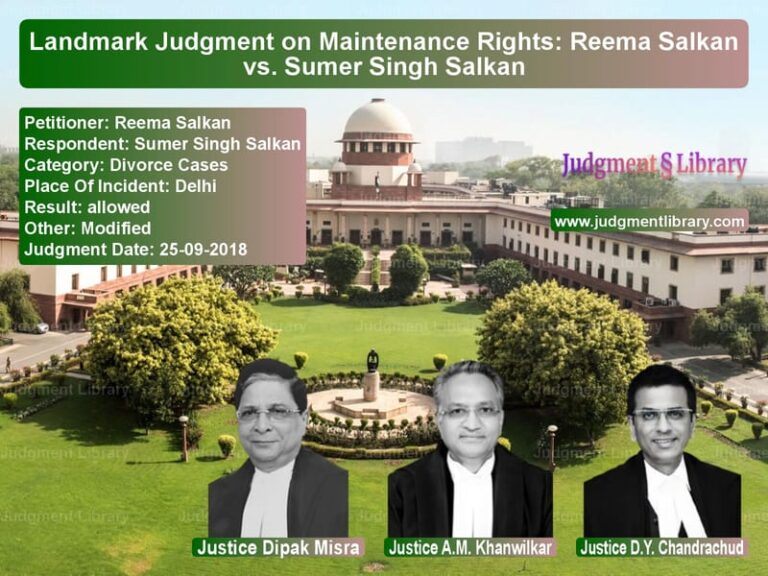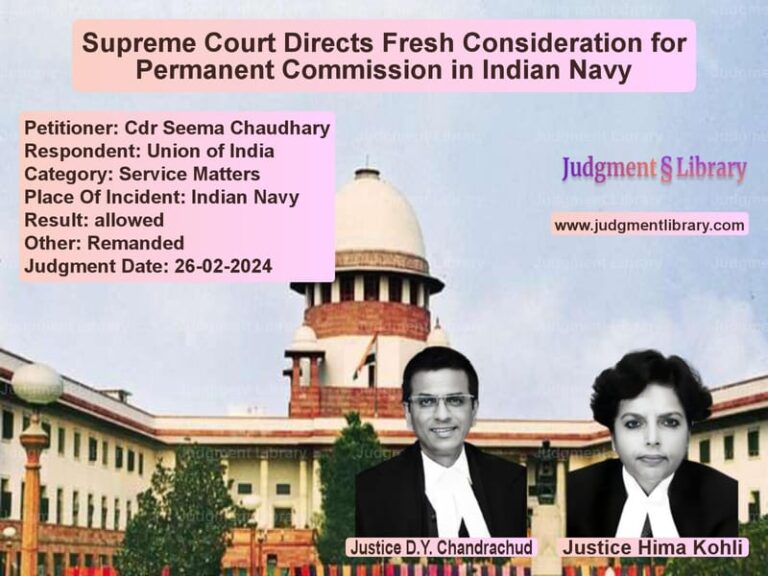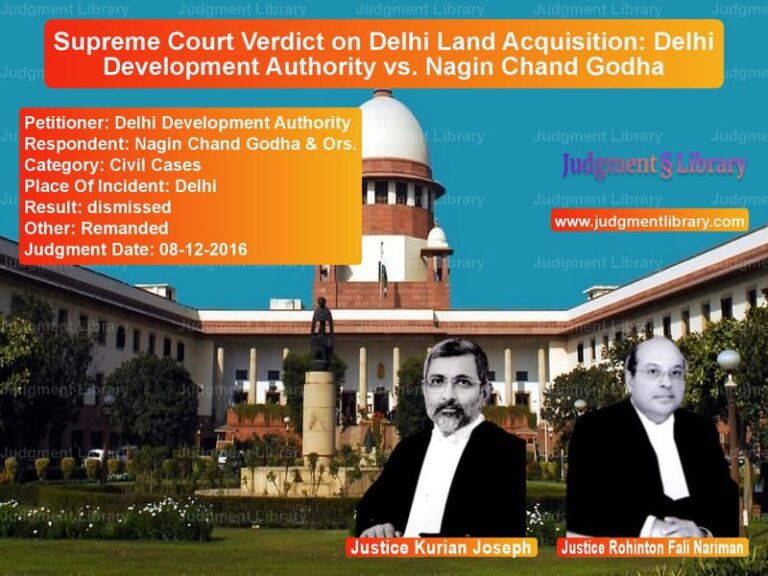Externment Order Validity: Supreme Court Upholds Additional District Magistrate’s Authority
The Supreme Court of India recently delivered an important judgment in The State of Madhya Pradesh & Ors. vs. Dharmendra Rathore, clarifying the jurisdiction of an Additional District Magistrate (ADM) in issuing externment orders under the Madhya Pradesh Rajya Suraksha Adhiniyam, 1990. The Court overturned the Madhya Pradesh High Court’s decision, confirming that the ADM had the power to pass externment orders when authorized by the State Government.
Background of the Case
The case stemmed from an externment order issued by the Additional District Magistrate, Gwalior, on February 26, 2013, against Dharmendra Rathore, directing him to leave the district for one year. Rathore challenged the order before the Commissioner, Gwalior Division, who dismissed his appeal on June 17, 2013.
Subsequently, he filed a writ petition in the Madhya Pradesh High Court, arguing that the ADM had no jurisdiction to issue an externment order under the Madhya Pradesh Rajya Suraksha Adhiniyam, 1990. The High Court, relying on its earlier ruling in Arvind Sharma vs. State of Madhya Pradesh, set aside the externment order, ruling that only a District Magistrate had the authority to issue such orders. The State of Madhya Pradesh then appealed to the Supreme Court.
Key Legal Issues
- Whether an Additional District Magistrate has the power to issue externment orders under the Madhya Pradesh Rajya Suraksha Adhiniyam, 1990.
- Whether the High Court correctly applied the Constitution Bench ruling in Ajaib Singh vs. Gurbachan Singh (1965) to invalidate the ADM’s order.
- Whether the Madhya Pradesh government’s delegation of powers to the ADM was legally valid.
Petitioners’ Arguments (State of Madhya Pradesh)
- The Madhya Pradesh Rajya Suraksha Adhiniyam, 1990, allows the State Government to delegate powers to an ADM.
- A notification issued on March 5, 2003, empowered ADMs in various districts to exercise the powers of a District Magistrate under the Act.
- The Constitution Bench ruling in Ajaib Singh vs. Gurbachan Singh (1965) was inapplicable because it dealt with the Defence of India Act, 1962, which had a different statutory scheme.
- The High Court misinterpreted the law by holding that only a District Magistrate could pass externment orders.
Respondents’ Arguments (Dharmendra Rathore)
- Sections 3, 4, 5, and 6 of the Madhya Pradesh Rajya Suraksha Adhiniyam, 1990, specifically empower only a District Magistrate to issue externment orders.
- The delegation of powers to an ADM was not explicitly permitted under the Act.
- The ruling in Ajaib Singh vs. Gurbachan Singh (1965) supported the argument that only a District Magistrate, not an ADM, could issue externment orders.
- The High Court correctly interpreted the law and prevented the arbitrary use of power.
Supreme Court’s Observations
The Supreme Court, comprising Justice Ashok Bhushan and Justice K.M. Joseph, ruled in favor of the State of Madhya Pradesh.
On the applicability of Ajaib Singh’s case, the Court clarified:
- “The decision in Ajaib Singh vs. Gurbachan Singh is based on the Defence of India Act, 1962, which explicitly restricted delegation of powers to officers below the rank of a District Magistrate.”
- “In contrast, the Madhya Pradesh Rajya Suraksha Adhiniyam, 1990, contains no such restriction and explicitly allows delegation of powers.”
On the power of delegation, the Court ruled:
- “Section 13 of the Act allows the State Government to delegate powers to officers below the rank of a District Magistrate.”
- “The notification dated March 5, 2003, empowering ADMs was legally valid.”
- “The High Court erred in holding that only District Magistrates could exercise the power of externment.”
The Court further emphasized:
- “Externment orders are preventive measures intended to maintain public order.”
- “Such powers, when exercised through proper delegation, are not unconstitutional.”
- “The High Court’s ruling has led to an incorrect interpretation of the law, which must be corrected.”
Final Verdict
The Supreme Court set aside the High Court’s ruling and upheld the validity of the ADM’s externment orders.
- The Additional District Magistrate is empowered to issue externment orders when authorized by the State Government.
- The High Court’s reliance on Ajaib Singh’s case was incorrect.
- The externment order against Dharmendra Rathore was legally valid.
- The Court directed that externment proceedings should continue under the delegated authority.
Legal and Social Implications
- The judgment clarifies that ADMs have the authority to issue externment orders under delegated powers.
- It prevents legal technicalities from obstructing the maintenance of law and order.
- The ruling ensures that preventive measures like externment can be enforced without unnecessary legal hurdles.
- It sets a precedent for similar cases involving delegation of powers under state security laws.
This ruling upholds the government’s authority to take necessary preventive actions against individuals posing threats to public safety while ensuring that such powers are exercised within the legal framework.
Petitioner Name: The State of Madhya Pradesh & Ors..Respondent Name: Dharmendra Rathore.Judgment By: Justice Ashok Bhushan, Justice K.M. Joseph.Place Of Incident: Gwalior, Madhya Pradesh.Judgment Date: 29-01-2019.
Don’t miss out on the full details! Download the complete judgment in PDF format below and gain valuable insights instantly!
Download Judgment: The State of Madhya vs Dharmendra Rathore Supreme Court of India Judgment Dated 29-01-2019.pdf
Direct Downlaod Judgment: Direct downlaod this Judgment
See all petitions in Bail and Anticipatory Bail
See all petitions in Custodial Deaths and Police Misconduct
See all petitions in Judgment by Ashok Bhushan
See all petitions in Judgment by K.M. Joseph
See all petitions in allowed
See all petitions in supreme court of India judgments January 2019
See all petitions in 2019 judgments
See all posts in Criminal Cases Category
See all allowed petitions in Criminal Cases Category
See all Dismissed petitions in Criminal Cases Category
See all partially allowed petitions in Criminal Cases Category

